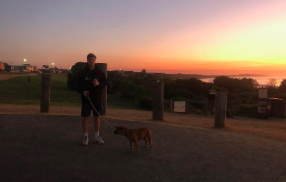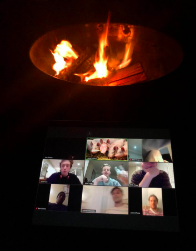A Brave New World On Its Way
Talking to my friends over the last few days/weeks has seen many different conversations emerge. Some optimistic, some filled with anxiety others completely unrelated to the fast-evolving zeitgeist we have found ourselves in.
What is undeniable and a common thread of all the short, long and complicated conversations has been the feeling of change. A feeling of transience that has swept across many aspects of our daily lives. A paradigm shift in the way the world is lived in and in particular, the way ‘work’ is looked at.
For some, the coronavirus outbreak and the workplace lockdowns have been the catalyst for a work from home realisation and revelation. No more commuting. No more public transport. No more boss. More hours in the day. I am one of the lucky ones, my commute is now a short walk around the block with Chika (the family dog). 
If you own an office building, I’m sorry, but it peaked in value on February 2020 and is unlikely to recover that value, possibly, ever, because the concept of “going to work” has changed, possibly, forever.
Marcus Today has worked incredibly well under the lockdowns and that is where my revelation comes from. Working at home more, if not permanently, has become a real possibility, as Marcus says, it might, at least, become a choice. It would save the business $100,000 a year in rent and office amenities, it would give us all an extra hour or two a day. It just might make sense.
 Of course it requires trust, we have that, we are a good Team, and it requires technology and it requires new attitudes when working ‘at home’. If it’s a regular rather than irregular thing then the way you do it has to change.
Of course it requires trust, we have that, we are a good Team, and it requires technology and it requires new attitudes when working ‘at home’. If it’s a regular rather than irregular thing then the way you do it has to change.
We have already had the email about taking it professionally. Dressing for your colleagues, having an eyeline camera not an up nose camera, not using a mobile phone, having a background that is professional not the inside of a bedroom, and being available, online, all of the time, as well as learning to socialise from our ‘workplace’…at home. Friday night Zoom chats with friends are filtering into the social landscape with all demographics, not just Millennials.
Obviously not all businesses will change, many can’t change, but somewhere on the scale between 0% and 100% will be a number of businesses who learn from this event that they can work outside the office.
It has tremendous implications, even if the number is only 10% or 20%, there will be more people working from home workspaces or flexible workspaces.
That means:
- Trusting employees.
- Work judged on delivery.
- No IT department.
- Less HR.
- Less cars.
- Less population density.
- Less 'centralisation'.
- A lot less middle managers.
- Less human issues.
- Less costs...more profit.
- Less need for human on human meetings.
- Less travel inter-State.
- A boom in home office equipment and networking, meeting, technology.
- Residential homes being designed with (quieter!) professional workspaces.
The negatives are that many office buildings become White Elephants (sell office REITS). With less tenants and lower rents. Businesses will gravitate to the best buildings and the most occupied buildings. There will be too many buildings. Landlords will have to make them more attractive. Some will need to be re-purposed.
.png)
There will also be less traffic, less public transport revenue and investment, less parking in the City, less foot traffic and less demand for retail, restaurants and bars in the CBD (sell more REITs).
For those that do continue to travel into work, offices may get bigger. Less people means more office space. Bigger offices for everyone. Bigger desks, bigger ‘spaces’. No cramming in next to people you may not want to be close to. We have all become aware of the need for social-distancing, but in the workplace this might mean no more need for anti-social distancing.
Then there is the interesting conundrum of residential property prices. The CoreLogic numbers last week saw national house prices up 0.2%, the first rise since the coronavirus hit. The suggestion is that house prices have bottomed and the top to bottom fall of 1.7% was not nearly as bad as the doomsday predictions of 5 to 10% falls from most commentators (some suggested a 20% fall). Record low rates driving a surge in first home buyers. While that's good news for property owners, the more astute observation looks at the implications for the demand for property in more rural areas.
One estate agent writing effusively “The flood gates are finally open and lifestyle properties are in high demand with one property in Blairgowrie only hitting the market last Wednesday and by Sunday we had completed 95 Private Inspections every 10-15minutes taking some 20 hours from Thursday. This lead to over 30 hot buyers, 15 offers and a mini-auction Sunday evening, that resulted in a sale $250K above reserve. Both Buyer and Vendor were ecstatic with the result.” The migration away from the CBD appears to be “on”. They blame it on “professionals looking for lifestyle homes to work from home with views, beach access, golf courses, vineyards and outdoor living”. Not sure the apartment market in Docklands can boast Lifestyle living if the CBD becomes a Ghost Town. Those CBD apartment property developments that sell in China first might well have peaked.
These are CoreLogic heat Maps of Melbourne and Sydney - appears that the heat has already started to radiate outwards.
.png)
.png)
Working ‘not in an office’ could just be the great suburb leveller. If people don’t need to live near a city anymore the ‘desirable’ but more remote suburbs (Like Torquay where my parents live), where the houses are bigger and the view is better, will suck value from the smaller blocks, with smaller more expensive houses on them, with a view of the neighbour’s laundry. Quality of housing will take preference to position of housing.
Back to the workplace.
Millennials, for the most part, have only just begun their journey into the workforce. Job security was about turning up, clean-shaven, and doing the hours. If we work remotely job security changes enormously. “Work” adopts different and more powerful meanings. What if our job security and salary become based on results rather than hours, on our electronic contribution down the wire rather than our relationship with the boss, working late. What if our ‘take-home’ (we’re already home!) becomes dependent on our financial results rather than our negotiated contract, our years of service and, and this is a major one, our age.
What a fantastic result for business and individuals that would be. What a fantastic result for older people. Judged on your merits not your age. What if businesses got to judge and pay people on their contribution and nothing else, what a great development for business.
It would be a revolution. Individuals rewarded on their merits whether they are young or old, no matter how qualified and no matter what school they went to.
University qualifications are already becoming a joke when so many university participants are basically paying for the qualification at the end rather than the skill set that will become their reason for being, their talent, their expertise, their genius, their financial protection and their mental nourishment, forever.
A meritocracy. Interesting. You have to ask yourself, if that became the reality, would that scare you or excite you. It’s a very important question.
It would excite me. I don’t want or need to be judged for my age or qualifications, on what I wear, whether I shave, whether I suck up to the boss, whether I stay late.
I want, as many Millennials surely want, to be judged for my brains, brilliance (or otherwise) and the quality and timeliness of my contribution. For working smart, not hard, for making a difference to the business whether that involves significant effort and hours or not.
This could re-write everything.
Of course, that’s not the reality for most Millennials at the moment. Because of our age, short time in the workforce and the legal implications, as well as the cost and moral hurdle of moving on a long-time employee versus a short time employee, many of us are losing jobs.
A lot of my mates, particularly in the hospitality and music industries, have lost their jobs, or have taken pay cuts - it isn’t very palatable. A friend was recently insulted by an email from his head office filled with supportive platitudes a day after they cut his pay by 20%. The virus has taught them, rather curtly, that they are at the bottom of the ladder and they don’t like it. It’s a matter of unfortunate timing rather than ability for our generation. All that schooling, dismissed. So much for dreams. It is high risk being young. When the system cracks, we are the first in line.
Meanwhile, this is a moment of opportunity for those businesses that will thrive and survive. An opportunity to shake things up, make changes, cut costs, re-organise structures, break bad practice and bite the bullet on any issue with a good excuse. But it is an opportunity only some people are going to participate in.
For some it will scar. When a cloud is cast over your value, your future, and you are dismissed, it is difficult to step back into the same relationship with the workplace, any workplace, and view the situation with a generous eye. Loyalty will not come easily again. Certainty of tenure has climbed the hierarchy of needs for Millennials because it has been so easily whipped away in this instance. Perhaps tomorrow’s employment contracts will adjust for that. Millennials will value being ‘safe’. If you want to attract them in hoards, stand out on that. Its no fun being the “Subscription Generation”, bought for a while but not forever.
But for some of us there are green shoots of optimism breaking through. Our employment is being redefined, for some of us, for the better. More flexible, more meritorious, more measurable, more trusted, less age sensitive, less relationship based, less dependent on subtle and unbusinesslike things, and less confined by traditional measures and biases that serve no benefit to the bottom line.
Some of us are going to be judged by what we deliver down the line. That won’t suit everyone, but it will suit many of us.
It's an interesting world we live in, and it is about to get more interesting.